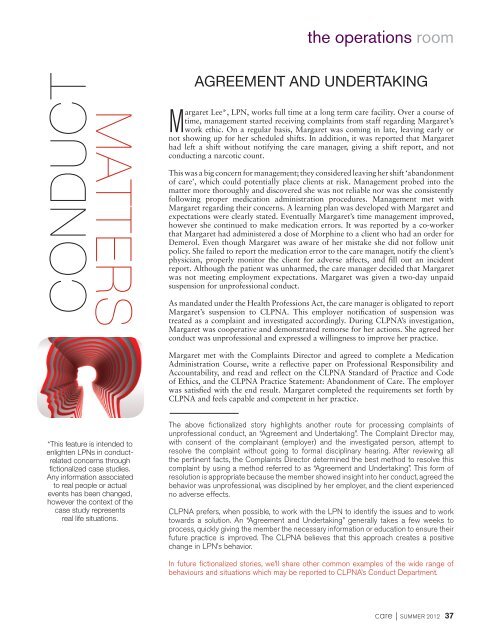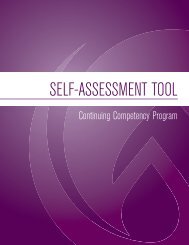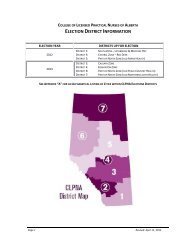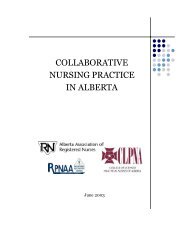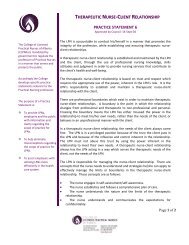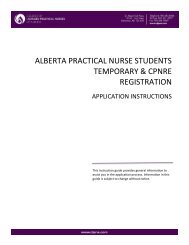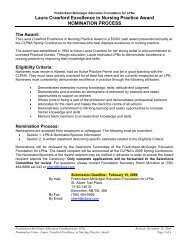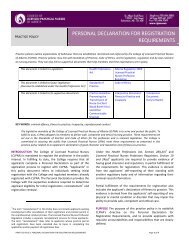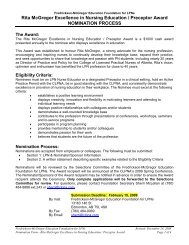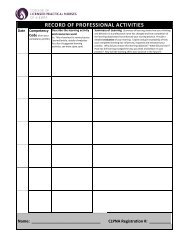Head, Heart & Hands-On Leadership - College of Licensed Practical ...
Head, Heart & Hands-On Leadership - College of Licensed Practical ...
Head, Heart & Hands-On Leadership - College of Licensed Practical ...
Create successful ePaper yourself
Turn your PDF publications into a flip-book with our unique Google optimized e-Paper software.
the operations roomMATTERSCONDUCTAGREEMENT AND UNDERTAKINGMargaret Lee*, LPN, works full time at a long term care facility. Over a course <strong>of</strong>time, management started receiving complaints from staff regarding Margaret’swork ethic. <strong>On</strong> a regular basis, Margaret was coming in late, leaving early ornot showing up for her scheduled shifts. In addition, it was reported that Margarethad left a shift without notifying the care manager, giving a shift report, and notconducting a narcotic count.This was a big concern for management; they considered leaving her shift ‘abandonment<strong>of</strong> care’, which could potentially place clients at risk. Management probed into thematter more thoroughly and discovered she was not reliable nor was she consistentlyfollowing proper medication administration procedures. Management met withMargaret regarding their concerns. A learning plan was developed with Margaret andexpectations were clearly stated. Eventually Margaret’s time management improved,however she continued to make medication errors. It was reported by a co-workerthat Margaret had administered a dose <strong>of</strong> Morphine to a client who had an order forDemerol. Even though Margaret was aware <strong>of</strong> her mistake she did not follow unitpolicy. She failed to report the medication error to the care manager, notify the client’sphysician, properly monitor the client for adverse affects, and fill out an incidentreport. Although the patient was unharmed, the care manager decided that Margaretwas not meeting employment expectations. Margaret was given a two-day unpaidsuspension for unpr<strong>of</strong>essional conduct.As mandated under the Health Pr<strong>of</strong>essions Act, the care manager is obligated to reportMargaret’s suspension to CLPNA. This employer notification <strong>of</strong> suspension wastreated as a complaint and investigated accordingly. During CLPNA’s investigation,Margaret was cooperative and demonstrated remorse for her actions. She agreed herconduct was unpr<strong>of</strong>essional and expressed a willingness to improve her practice.Margaret met with the Complaints Director and agreed to complete a MedicationAdministration Course, write a reflective paper on Pr<strong>of</strong>essional Responsibility andAccountability, and read and reflect on the CLPNA Standard <strong>of</strong> Practice and Code<strong>of</strong> Ethics, and the CLPNA Practice Statement: Abandonment <strong>of</strong> Care. The employerwas satisfied with the end result. Margaret completed the requirements set forth byCLPNA and feels capable and competent in her practice.*This feature is intended toenlighten LPNs in conductrelatedconcerns throughfictionalized case studies.Any information associatedto real people or actualevents has been changed,however the context <strong>of</strong> thecase study representsreal life situations.The above fictionalized story highlights another route for processing complaints <strong>of</strong>unpr<strong>of</strong>essional conduct, an “Agreement and Undertaking”. The Complaint Director may,with consent <strong>of</strong> the complainant (employer) and the investigated person, attempt toresolve the complaint without going to formal disciplinary hearing. After reviewing allthe pertinent facts, the Complaints Director determined the best method to resolve thiscomplaint by using a method referred to as “Agreement and Undertaking”. This form <strong>of</strong>resolution is appropriate because the member showed insight into her conduct, agreed thebehavior was unpr<strong>of</strong>essional, was disciplined by her employer, and the client experiencedno adverse effects.CLPNA prefers, when possible, to work with the LPN to identify the issues and to worktowards a solution. An “Agreement and Undertaking” generally takes a few weeks toprocess, quickly giving the member the necessary information or education to ensure theirfuture practice is improved. The CLPNA believes that this approach creates a positivechange in LPN’s behavior.In future fictionalized stories, we’ll share other common examples <strong>of</strong> the wide range <strong>of</strong>behaviours and situations which may be reported to CLPNA’s Conduct Department.care | SUMMER 2012 37


